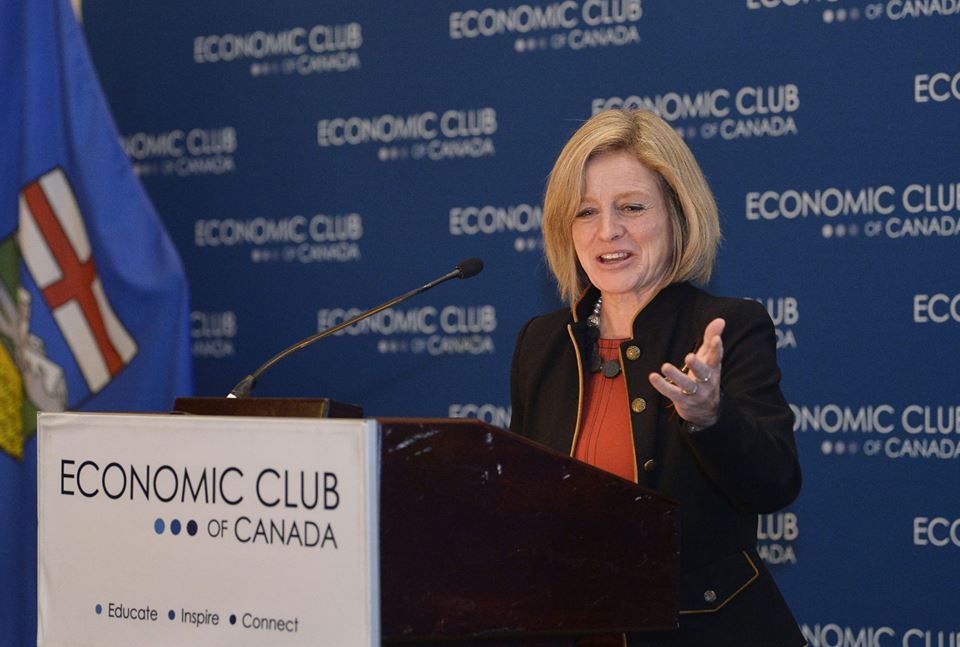
OTTAWA – Alberta Premier Rachel Notley says it makes no sense for Ottawa to use one hand to buy the Trans Mountain pipeline for $4.5 billion, and another to push legislation that would deter investors from future energy projects.
Notley was in Ottawa Thursday giving the Senate her take on Bill C-69, the Impact Assessment Act, which overhauls the way energy projects are assessed for their effects on the environment as well as contributions to the country’s social and economic well-being.
When Environment Minister Catherine McKenna introduced the legislation a year ago, she said it was designed to attract new investment by giving the industry certainty about the criteria by which their proposed projects would be assessed and set timelines for reviews.
Notley says the bill does the opposite.
“I will give (the Liberal government) credit for stepping in to buy Trans Mountain, but I also think there is a high level of investor uncertainty that exists right now in the way in which it’s written,” she said in a press conference after the committee meeting.
“We cannot allow that uncertainty to continue. You can’t build trust by saying, ‘Trust us.’ You build trust by providing clarity.”
Other provincial governments of different political stripes have joined Notley in calls for changes to the bill before it becomes law.
On Thursday, the Senate committee studying the bill heard requests from Newfoundland Premier Dwight Ball and Saskatchewan Energy Minister Bronwyn Eyre. Ontario Energy Minister Greg Rickford presented to the Senate’s energy committee earlier this week.
Ball agreed with Notley that scrapping C-69 is not the way to go, but asked for amendments to exempt offshore oil exploration. He said the bill will drive capital investments elsewhere, to places where production doesn’t have the same environmental protections as Canada does.
Rickford told the committee C-69, as written, would make building new or replacing existing pipelines “impossible” and fears it will impede Ontario’s nuclear energy policies.
The federal government hasn’t yet published a list of project types that would be affected by the legislation.
The House of Commons made more than 130 amendments before it landed in the Senate. Tim McMillan, president of the Canadian Association of Petroleum Producers, told the committee last week the changes from MPs made the bill more complicated and provided less clarity.
McMillan said the long, drawn-out legal challenges that have delayed the Trans Mountain pipeline will be the norm if the bill passes as-is. In particular, there is too much discretion given to cabinet to interfere in a project’s approval, he said.
McKenna’s spokeswoman Sabrina Kim said in a statement Thursday the government is open to considering additional amendments. She blames the environmental assessment policies of the former Conservatives for the legal challenges delaying energy projects, and said the Liberals are keen to ensure the system protects the environment while still getting Canadian resources to market.
Among the amendments Notley wants to see are a hard two-year deadline for the assessment and review process. She noted the proposal to expand Trans Mountain, which would triple an existing pipeline’s capacity between Edmonton and Burnaby, B.C., was first brought forward in 2013 and remains mired in legal battles.
Notley also wants most new Alberta energy projects, including in-situ oilsands developments and petrochemical refineries, exempted from the bill because of existing provincial review processes and her government’s climate-change policies.
She said the Alberta government has attracted $12 billion in investments for petrochemical and upgrading facilities. “We don’t want to see that caught up in duplicative regimes that scare away investors we’ve worked so hard to attract,” she said.
Notley told senators Alberta’s struggle to get its oil to market has become a national unity issue, noting her government forced oil companies in the fall to cut production because of a collapse in oil prices.
“Over in the Maritimes they are importing Saudi oil. Here in Ontario you are importing American oil, both at world prices, and meanwhile in Alberta we are cutting production,” she said. “I told (the Senate) very clearly this is not how you build a country.”
The proposed Energy East pipeline that would have carried Alberta crude to eastern Canadian refineries was abandoned in 2017 with TransCanada citing market changes and uncertainty created by federal government policies.
Notley said if C-69 passes, it will certainly discourage anyone from trying to get that pipeline back underway.